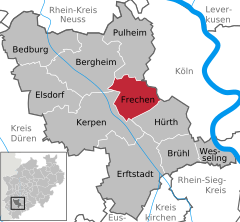Frechen | |
|---|---|
 Protestant church | |
Location of Frechen within Rhein-Erft-Kreis district  | |
| Coordinates: 50°55′N 6°49′E / 50.917°N 6.817°E | |
| Country | Germany |
| State | North Rhine-Westphalia |
| Admin. region | Cologne |
| District | Rhein-Erft-Kreis |
| Subdivisions | 9 |
| Government | |
| • Mayor (2020–25) | Susanne Stupp[1] (CDU) |
| Area | |
• Total | 45.11 km2 (17.42 sq mi) |
| Highest elevation | 158 m (518 ft) |
| Lowest elevation | 58 m (190 ft) |
| Population (2023-12-31)[2] | |
• Total | 53,128 |
| • Density | 1,200/km2 (3,100/sq mi) |
| Time zone | UTC+01:00 (CET) |
| • Summer (DST) | UTC+02:00 (CEST) |
| Postal codes | 50226 |
| Dialling codes | 02234 |
| Vehicle registration | BM |
| Website | www.stadt-frechen.de |
Frechen (German pronunciation: [ˈfʁɛçn̩]; Ripuarian: Frechem) is a town in the Rhein-Erft District, North Rhine-Westphalia, Germany. Frechen was first mentioned in 877. It is situated at the western Cologne city border.
It is the site of the 1257 Battle of Frechen between Conrad von Hochstaden, Archbishop of Cologne and the people of the town. In the 16th century it became known for locally produced terra cotta products, especially the "Bartmannskrug" (beardman jug).
In the late 18th century lignite was industrially mined. Digging for lignite dominated the city's economy until the end of the 20th century, and in 1891 the first briquette factory was opened.
On 2 September 1951 Frechen received its city-rights including the villages of Bachem, Hücheln and Buschbell. On 1 January 1975 the nearby villages of Grefrath, Habbelrath, Königsdorf and Neufreimersdorf were also incorporated.
In 1971, the Keramion, a ceramics museum in a distinctive glass-enclosed modern structure designed by architect Peter Neufert, opened to display the extensive historic and contemporary collection of local collector Gottfried Cremer.
From the 1980s onwards an increasing number of industrial, commercial and service enterprises choose Frechen as their location, so that the town changed its features considerably.
- ^ Wahlergebnisse in NRW Kommunalwahlen 2020, Land Nordrhein-Westfalen, accessed 29 June 2021.
- ^ "Bevölkerung der Gemeinden Nordrhein-Westfalens am 31. Dezember 2023 – Fortschreibung des Bevölkerungsstandes auf Basis des Zensus vom 9. Mai 2011" (in German). Landesbetrieb Information und Technik NRW. Retrieved 2024-06-20.



